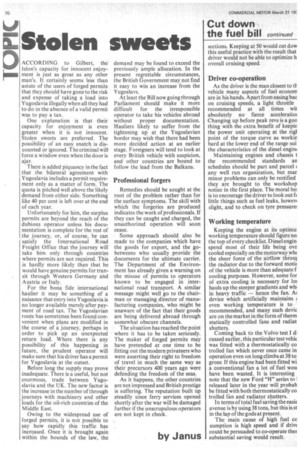Stolen sweets
Page 72

If you've noticed an error in this article please click here to report it so we can fix it.
ACCORDING to Gilbert, the felon's capacity for innocent enjoyment is just as great as any other man's. It certainly seems less than astute of the users of forged permits that they should have gone to the risk and expense of taking a load into Yugoslavia illegally when all they had to do in the absence of a valid permit was to pay a tax.
One explanation is that their capacity for enjoyment is even greater when it is not innocent. Stolen sweets are preferred. The possibility of an easy snatch is discounted or ignored. The criminal will force a window even when the door is ajar.
There is added piquancy in the fact that the bilateral agreement with Yugoslavia includes a permit requirement only as a matter of form. The quota is pitched well above the likely demand from either side. Something like 40 per cent is left over at the end of each year.
Unfortunately for him, the surplus permits are beyond the reach of the dubious operator unless his documentation is complete for the rest of the journey, or, of course, he can satisfy the International Road Freight Office that the journey will take him only through countries where permits are not required. This is hardly more likely than that he would have genuine permits for transit through Western Germany and Austria or Italy.
For the bona fide international haulier it may be something of a nuisance that entry into Yugoslavia is no longer available merely after payment of road tax. The Yugoslavian route has sometimes been found convenient when plans are modified in the course of a journey, perhaps in order to pick up an unexpected return load. Where there is any possibility of this happening in future, the prudent operator will make sure that his driver has a permit for Yugoslavia at the outset.
Before long the supply may prove inadequate. There is a useful, but not enormous, trade between Yugoslavia and the UK. The new factor is the increase in the number of through journeys with machinery and other loads for the oil-rich countries of the Middle East.
Owing to the widespread use of forged permits, it is not possible to say how rapidly this traffic has increased. Once it is brought again within the bounds of the law, the demand may be found to exceed the previously ample allocation. In the present regrettable circumstances, the British Government may not find it easy to win an increase from the Yugoslays.
At least the Bill now going through Parliament should make it more difficult for the irresponsible operator to take his vehicles abroad without proper documentation. Hauliers likely to suffer from the tightening up at the Yugoslavian border may wish that there had been more decided action at an earlier stage. Foreigners will tend to look at every British vehicle with suspicion, and other countries are bound to follow the lead from the Balkans.
Professional forgers
Remedies should be sought at the root of the problem rather than for the surface symptoms. The skill with which the forgeries are produced indicates the work of professionals. If they can be caught and charged, the unauthorized operation will soon cease.
Some approach should also be made to the companies which have the goods for export, and the gobetweens who usually provide the documents for the ultimate carrier. The Department of the Environment has already given a warning on the misuse of permits to operators known to be engaged in international road transport. A similar message might well go to the chairman or managing director of manufacturing companies, who might be unaware of the fact that their goods are being delivered abroad through somewhat obscure channels.
The situation has reached the point where it has to be taken seriously. The maker of forged permits may have pretended at one time to be fitting out the modern privateers who were asserting their right to freedom of travel in much the same way as their precursors 400 years ago were defending the freedom of the seas.
As it happens, the other countries are not impressed and British prestige is suffering. The reputation built up steadily since ferry services opened shortly after the war will be damaged further if the unscrupulous operators are not kept in check.








































































































































